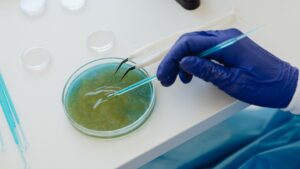Introduction
Imagine living in a world where disease is a thing of the past and aging is just a myth. Sounds like a fantasy novel, right? Well, thanks to the incredible advancements in biotechnology, this fantasy is inching closer to reality.
Biotechnology – A Science of Innovation
What is Biotechnology?
Biotechnology is a fascinating field that can be likened to a scientist’s magic wand. It encompasses a wide range of techniques and processes that involve using living cells and molecules to solve problems or create new products. In essence, biotechnology is akin to cooking, but instead of using traditional ingredients like flour and sugar, scientists are working with genes and proteins.
This transformative science has led to breakthroughs in medicine, agriculture, environmental science, and many other areas, offering innovative solutions and pushing the boundaries of what’s possible through the manipulation of biological materials.
Historical Perspective

Biotechnology, much like a fine wine, has matured and evolved over time, tracing its origins back to ancient practices such as beer brewing. Its historical journey unfolds across centuries, weaving a tale of innovation and discovery.
From rudimentary fermentation processes to the cutting-edge realm of gene editing and molecular manipulation today, the roots of biotechnology delve deep into our human quest to understand and harness the power of living organisms.
It’s a testament to the continuous refinement and advancement in scientific knowledge, shaping a field that touches various aspects of our lives in profound ways.
The Tools of the Trade
Indeed, CRISPR (Clustered Regularly Interspaced Short Palindromic Repeats) is a powerful tool in the world of biotechnology. It’s not a snack, but rather a revolutionary gene-editing technology that allows scientists to precisely modify genes in a manner similar to how a skilled tailor alters a suit to achieve a perfect fit.
CRISPR has opened up new possibilities in genetics, enabling researchers to edit genes in a targeted and efficient way, which has significant implications for fields like genetic engineering, medicine, and agriculture.
It’s like the tailor’s needle and thread for the genetic code, offering the potential to customize organisms and treatments to meet specific needs and challenges.
Biotechnology in Medicine

Personalized Medicine
Picture a medical approach designed exclusively for you, shaped by the intricacies of your genetic blueprint. Biotechnology is forging ahead, making this vision a tangible reality by customizing treatments to perfectly align with your individual genetic composition.
It’s akin to having a medical expert intricately woven into your genetic code, ensuring therapies and medications are uniquely suited to your specific needs.
This personalized medicine revolutionizes healthcare, aiming not for a one-size-fits-all approach but for tailored solutions that optimize effectiveness and minimize risks based on your distinct genetic identity.
Regenerative Medicine
Regenerative medicine is a cutting-edge field that seeks to harness the body’s natural ability to repair and regenerate tissues and organs, much like how a starfish can regrow a lost limb. At the heart of regenerative medicine are stem cells, which can be thought of as tiny construction workers with the remarkable ability to build and repair various parts of the body.
These versatile cells hold the potential to revolutionize healthcare by enabling the growth of new tissues, repairing damaged organs, and even potentially restoring lost functions.
Regenerative medicine brings us closer to the dream of regenerating body parts and improving the quality of life for individuals with injuries or degenerative diseases.
Gene Therapy
Certain diseases can be likened to errors or typos within your genetic instructions. Gene therapy emerges as a groundbreaking solution aimed at rectifying these genetic anomalies, presenting a beacon of hope for conditions that were previously considered untreatable.
By addressing these genetic ‘typos,’ gene therapy endeavors to correct the underlying causes of diseases, potentially offering new paths towards managing and even curing ailments that were once deemed insurmountable. This innovative approach holds promise in reshaping the landscape of medicine, providing renewed hope for individuals facing genetic-based conditions.
Fighting Cancer

Biotechnology indeed plays a pivotal role in the ongoing battle against cancer, akin to a skilled warrior equipping doctors with potent new weapons. This multidisciplinary field has led to groundbreaking advancements in cancer treatment, including targeted therapies that specifically attack cancer cells while sparing healthy ones and immunotherapy, which empowers the body’s own immune system to recognize and eliminate cancerous cells.
Biotechnology’s arsenal also includes precision medicine, which tailors treatments to an individual’s genetic makeup, and cutting-edge diagnostic tools that enable early detection and personalized care.
With these innovative approaches, biotechnology is transforming the way we combat cancer, offering hope and improved outcomes for patients worldwide.
Ethical Considerations
Playing God or Saving Lives?
The immense capabilities of biotechnology bring with them profound ethical considerations. It’s akin to a double-edged sword, holding tremendous promise for transforming lives while simultaneously sparking thought-provoking questions akin to a curious child’s inquiries.
As we delve deeper into manipulating genes, enhancing capabilities, and altering life itself, the ethical line becomes increasingly blurred. The power to heal and enhance lives also raises concerns about the ethical boundaries and potential consequences of playing an active role in reshaping nature.
It’s a constant balancing act between harnessing the potential of biotechnology for the greater good while responsibly navigating the ethical and moral implications that accompany such power.
Access to Care
- Healthcare Equity Initiatives: Governments and organizations can implement policies and initiatives aimed at reducing healthcare disparities.
- These may include subsidizing treatment costs for low-income individuals, expanding health insurance coverage, and increasing funding for research and development of affordable biotech solutions.
- Research and Development Funding: Governments and philanthropic organizations can invest in research and development efforts focused on creating cost-effective biotech treatments and therapies. This can drive innovation and lead to more accessible healthcare solutions.
- Price Regulation: Governments can implement price controls or negotiate drug prices with pharmaceutical companies to ensure that medications and therapies remain affordable. This approach has been used in some countries to control healthcare costs.
- Generic Medications: Encouraging the development and availability of generic versions of biotech drugs and therapies can significantly reduce costs, making them more accessible to a broader population.
- Public-Private Partnerships: Collaborations between governments, private companies, and non-profit organizations can help bring down the cost of biotech treatments and expand their availability to underserved populations.
- Telemedicine and Remote Care: Expanding telehealth and remote care options can improve access to healthcare services, particularly for individuals in remote or underserved areas.
- Patient Assistance Programs: Pharmaceutical companies can establish patient assistance programs that provide financial assistance to individuals who cannot afford the full cost of biotech treatments.
- Education and Awareness: Promoting awareness about available healthcare resources and financial assistance programs can help individuals navigate the healthcare system and access necessary treatments.
Addressing the accessibility challenge in biotechnology and healthcare in general requires a multifaceted approach involving government policies, industry cooperation, and public awareness to ensure that everyone can benefit from the advancements in biotech treatments without facing insurmountable financial barriers.
The Future – What Lies Ahead?

Biotechnology and Aging
Biotechnology is delving into the realm of extending longevity, exploring avenues to decelerate or potentially reverse the aging process. It’s akin to discovering a modern-day fountain of youth within the confines of a laboratory.
By unraveling the intricacies of aging at a molecular level, researchers are aiming to develop interventions that might prolong healthy lifespans.
This exploration doesn’t promise immortality, but it does offer a glimpse into the potential for enhancing the quality and duration of human life, potentially reshaping our understanding of aging and its implications.
Nanotechnology in Medicine
Nanotechnology in medicine is like unleashing an army of microscopic superheroes within your body. These tiny robots, often referred to as nanobots or nanoparticles, are engineered to perform specific tasks, such as targeting and treating diseases at the cellular level.
They hold the potential to revolutionize healthcare by delivering medications precisely where needed, removing harmful toxins, and even repairing damaged tissues. This innovative approach is not science fiction but a promising reality, offering the potential for more effective and minimally invasive treatments with fewer side effects.
Nanotechnology is unlocking new frontiers in medicine, where the tiniest of warriors are making a big impact on our health and well-being.
Global Collaboration
The trajectory of biotechnology’s future resembles a vast puzzle, and scientists worldwide are collaborating intricately to piece it together. It’s a collective effort transcending borders and boundaries, uniting diverse minds in pursuit of a shared goal: advancing biotechnology for the collective benefit of humanity worldwide.
This global collaboration isn’t just about scientific breakthroughs; it’s about fostering unity in knowledge, pooling resources, and leveraging varied expertise to unlock the mysteries and potentials of biotechnology. It’s a testament to the power of collaboration in steering progress towards a common global good.
FAQ’s
- Q: Is biotechnology safe? A: Like driving a car, biotechnology comes with risks and benefits. Proper regulations and precautions can make the journey safer.
- Q: Will biotechnology make treatments more expensive? A: Initially, yes, like buying a new car. But over time, costs may decrease as technology becomes more accessible.
- Q: Can biotechnology cure all diseases? A: It’s a hopeful future but not a guaranteed one. Think of biotechnology as a growing tree; it needs time and care to reach its full potential.
Conclusion
Well, there you have it, friends! The world of biotechnology is like a thrilling novel full of twists and turns, possibilities, and promise.
From personalized medicine to the potential for immortality, biotechnology is revolutionizing how we think about health and healing. It’s like having a crystal ball that shows a glimpse of a future where suffering and disease could become a thing of the past.
Of course, there are challenges and ethical dilemmas to navigate, like sailing through stormy seas. But with careful consideration and responsible action, the future looks bright.
So, here’s to the scientists, the dreamers, and the doers who are working to turn science fiction into scientific fact. The future of health is unfolding before our eyes, and it’s an exciting time to be alive!

